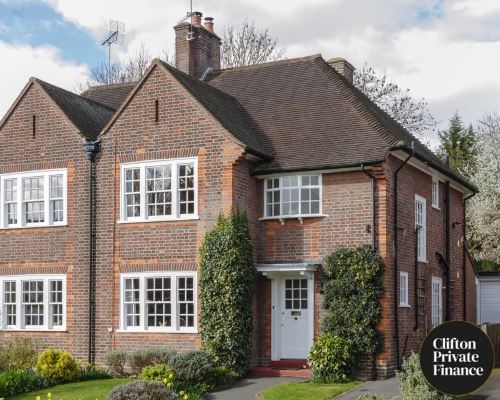Bridging Loan Broker
Require A short Term Bridging Loan?
Speak to us to arrange finance fast...

Quick Links
Based in Bristol and Cardiff we provide a bridging loan broker service to help you secure land or property cost-effectively.
We can provide:
- Market leading bridging loans from £50,000 to £25m
- Rates from 0.55% pm
- Lower rates for £1 million+ loans
- Fast Finance - if required 7 working days is possible depending on your circumstances
- Terms from 3 months to 3 years
- LTVs up to 80% (can be more if other assets are in the background)
- Interest roll-up options
- Residential (On a regulated bridging basis), buy-to-let, HMO, investment and commercial properties considered
- Light refurbishment finance (currently uninhabitable, under permitted development rules, requires internal refurbishment)
- Heavy refurbishment finance (extensions, basement digs, loft conversions, commercial to residential, barn conversions)
- Property development finance - for new builds and conversions
- Bridging finance for business purposes (Pay HMRC tax bill, purchasing land or new premises, deposit for new purchase, business growth)
- Alternative assets considered e.g. pension, investment portfolios, fine art, classic cars
- Automated valuation option for properties under £1m
We provide a friendly, professional service to help you get the money you need at the best available rates.
Recent bridging loan rates we've secured for clients:
Rates from: Downsizing/Upsizing Releasing Funds From Your Home Short-Term Lease Finance Auction Purchase As at 3rd January 2024 Rates from: Light & Heavy Refurb Finance For Unmortgageable Properties Land Purchase with planning As at 3rd January 2024 Rates from: Up to 80% LTV Minimum Loan £500k Minimum net income £100k As at 3rd January 2024 Thank You for your interest - please complete the form below and a member of our team will be in contact.Residential
Buying Before Selling?
0.50% pm
Development & Refurb
Fast Finance
0.50% pm
Residential
Large Bridging Loans
0.50% pm
Contact Us
Remember, bridging loan interest rates vary depending on your lender, loan-to-value, exit strategy, the current market, and other factors.
Why Clifton Private Finance?
We are bridging loan experts, and our advisers know the complex ins and outs of the bridging market.
In fact, in 2022, we won two awards for our bridging service.
And we also won Bridging Broker of the Year 2023.
We can help you:
- Decide if a bridging loan is right for you
- Understand what type of loan best suits your situation
- Feel comfortable with how the process works and what the costs will be
And when we've established the best type of bridging finance for you, we will:
- Compare rates across the entire market
- Negotiate the best deal for your circumstances
- Guide you through the application process
- Help you arrange your valuation(s)
- Liaise with your solicitor to sort the paperwork
- Chase through your application until the funds are in your bank account
Let us do all the hard work of finding the right bridging lender for your circumstances. We secure bridging finance for applications of all types, and we negotiate competitive lending to meet your needs and timescale.
Sam O'Neill
Head of Bridging
Bridging Loan Case Studies
Read through our 100+ bridging loan case studies, breaking down the details of how bridging loan transactions work in practice:






Speak to one of our bridging loan experts today - call us on 0117 959 5094
Or book a FREE telephone consultation at a time to suit you
Want to know more about bridging loans? Our video below covers the basics.
Written by: Sam O'Neill & Sam Hodgson
Last Updated: 02/11/2023
What is a Bridging Loan Broker?
A bridging loan broker is a financial intermediary that helps individuals and businesses obtain a bridging loan from a lender.
Brokers have access to a network of lenders across the market, offering you access to a wide range of finance products.
In the UK, bridging loans aren’t offered by high street banks, and many private and specialist lenders that provide bridging loans operate through bridging loan brokers.
It’s possible to get a bridging loan without using a broker, but working with a bridging broker can streamline the process drastically and get you access to deals that you may not find on the market by yourself.
A good bridging loan broker has an in-depth knowledge of the market which products you’re eligible for, and has long-standing relationships with lenders.
In many cases, these relationships can work in your favour. A bridging broker’s understanding of the market not only allows opportunity for tailored finance from some lenders, but your brokers can also present your application to the lender in the best possible light.
What Does a Bridging Loan Broker Do?
A bridging loan broker assesses the market conditions and lender options against your own financial needs to help you select the most suitable lender for a bridging loan.
Brokers facilitate the loan application process, offer guidance, and negotiate loan terms on your behalf. Working with a broker ensures efficiency, compliance, and helps provide effective communication between the lender, any third parties involved in the process (solicitors, underwriter, etc.) and yourself.
This helps to simplify the journey towards securing capital and get you access to the best rates.
Do Banks Offer Bridging Loans?
High street banks don’t offer bridging loans in the UK. This does mean that the lending pool is slightly smaller in comparison to mortgage finance,but bridging loans are not necessarily difficult to access, especially with the aid of a broker.
Bridging loans are widely accessed through private and specialist lenders across the country. These loans can be a flexible and convenient method of securing the funds you need.
While bridging loans are typically more costly than mortgage finance, they can be a suitable option if you’re under time constraints. Working with a bridging broker also assures that you will get the most affordable rates on the market for your circumstances.
How Long Does It Take to Arrange a Bridging Loan?
Bridging loans can be arranged in as little as 7 working days, but this does depend on the complexity of the bridge loan and your specific circumstances.
Bridging loans are a popular option for homebuyers who need to meet a deadline, such as buying a property at auction or breaking a chain.
The length of your bridging application will depend on the complexity of your financial circumstances and the property you’re looking to purchase. While more complicated bridging loan cases can take longer to process, bridging loan applications are generally quicker and simpler than securing a mortgage.
This is for two primary reasons:
-
Bridging finance is designed to be quick and flexible to meet the needs of borrowers looking to bridge a gap in funding
-
Bridging loans are repaid in a lump sum (usually within 12 months) through the sale of a house or another anticipated means of funds. It’s much easier to value a property or another form of assets than to verify employment or project rental income, which is a key part of why bridging loans can be easier forms of finance to secure.
If you do need to secure finance within a certain timeframe, working with a broker can be useful. Working with experienced professionals can help streamline the process and minimise delays, especially if you’re unfamiliar with the bridging process.
It's important to communicate your specific time constraints and financial needs with your lender or broker to ensure they understand your urgency and can work to meet your timeline.
We may be able to facilitate a fast-tracked service if you meet the bridging loan criteria and need access to funds quickly. Get in touch to see what we can do for you.
Do You Pay a Bridging Loan Monthly?
You will typically need to repay a bridging loan in one lump sum. Some lenders do offer the option to repay your loan monthly, but this is less common and will need to be agreed in advance.
A bridging loan’s primary function is to be a source of short-term capital between two financial transactions. Their repayment terms are structured around this, allowing you flexibility to pay off your loan early, and you’ll also only be charged interest for the months that you had the loan.
It is essential to be aware that terms can vary from lender to lender. In many cases, you will be expected to repay your loan in full within the loan terms, and your interest will be rolled up and paid at the end of the allotted period too.
However, this is not the case for every product on the market, so it’s important to clarify the terms with your lender before committing to anything.
If you feel you have more complex requirements or need specific terms arranged, it’s worth speaking to a bridging broker.
At Clifton Private Finance, we offer award-winning customer care and have relationships with private and specialist lenders across to the market that we can use to negotiate the best terms on your behalf.
Can I Get a Bridging Loan with Bad Credit?
Yes, you can get a bridging loan with poor credit. Credit issues can present less of a problem when seeking a bridging loan because the largest focus of your application will be on your exit strategy.
The short-term nature of bridging finance means that lenders won’t be relying on you to meet monthly payments over a long-term period, so your credit score is less of a focus than with a mortgage.
Specialist bridging lenders can also be more accommodating to unique circumstances. They may be more understanding of the fact that any past credit issues don’t necessarily represent your current financial situation.
However, if you are unsure what your options are, it’s worth getting in touch with a bridging broker.
How Easy Is it to Get a Bridging Loan?
With the right help, applying for a bridging loan can be relatively simple and stress-free. If you have a solid exit strategy in place, there is a high chance that you’ll secure the funding you need.
Here at Clifton Private Finance, we can help guide you through your options, whether you're new to bridging loans or are more experienced with this type of financing.
We offer first-rate customer care, industry expertise and access to lenders from across the market to make sure you get the best rates for your circumstances.
Get in touch...
We can help with meeting tight deadlines & provide fast and professional bridging loan service.
Call our team on 0117 959 5094 to discuss your requirements or book an appointment below.
You can also use our 24/7 enquiry service through live chat - contact us any time, and we'll get back to you as soon as possible - we reply to every message!
FAQs
Yes, a valuation is typically required for a bridging loan in the UK. Since bridging loans are often secured against a property or other valuable assets, lenders will want to assess the market value of the property being used as security. This helps the lender determine how much deposit they want you to provide based on the value and condition of the property. You can borrow up to £25m with bridging finance, but it’s typically capped at about 80% of the value of the property you’re using as security. It's important to note that different lenders have varying policies and criteria regarding the maximum loan amounts they offer for bridging finance. Some lenders have a maximum limit of over £1 million, while others may specialize in smaller loan amounts. Additionally, the terms and conditions of the loan, including interest rates and fees, should also be taken into consideration when determining the overall affordability of the bridging loan. Yes, you typically need a 20-40% deposit for a bridging loan. It can be possible to get a bridging loan without a deposit (a 100% bridging loan), but you’ll need other assets in the background to secure the loan against, and more stringent criteria and higher costs could apply. Yes, it is possible to get a 100% bridging loan (also known as a 100% LTV bridging loan), but it is rare. This means that you won’t need to put down a deposit and can borrow the full value of your property. However, the criteria for these loans can be hard to meet, and you’ll need to provide additional assets as security for your loan. Interest rates and fees can also be higher to compensate. While using bridging finance doesn’t technically make you a cash-buyer, it can allow you to act like one. Mortgages take months to process, often leading to an ‘onward chain’ where all parties involved need to wait for funds to be transferred. Bridging finance can usually be accessed a lot quicker than mortgages so you can bypass the onward chain, giving you an advantage over other buyers and being attractive to sellers. Bridging loans typically have a term of 12 months, but some lenders are willing to stretch their terms to 18 months, or even 2 –3 years depending on the case. Terms longer than 2 years will usually only be considered for specific cases. Yes, you can use a bridging loan to pay Stamp Duty. This amount could be covered by a bridging loan, providing you have a way to repay the additional borrowing amount to your lender. Yes, bridging loans are safe when they’re used in the right circumstances with a solid repayment strategy. However, we recommend speaking to a qualified advisor, like our brokers at Clifton Private Finance, before you take out a product. The main factors to consider with bridging finance are that the full loan amount will usually need to be repaid within a year, and like a mortgage, it is secured against a property as collateral. This means that in the case that you aren’t able to repay your bridging loan, your property would be at risk of repossession. But with a watertight exit strategy, bridging finance can be an efficient way to secure property quickly. Bridging loans are designed to be short-term so there’s no maximum age limit when applying for a bridging loan. This does depend on the lender, as some bridging lenders do have an upper age limit, but there are lenders on the market who offer bridging loans for borrowers aged 70 and over. Bridging loan interest rates usually range between 0.45% - 2% per month, depending on the case and the market rate. Unlike mortgage interest rates, bridging loan interest is calculated monthly instead of yearly. This is because bridging loans are short-term and, in many cases, repaid within a year. Bridging loans can be arranged without early repayment penalties, so interest is calculated monthly to ensure you only pay interest on the months you have the loan for. Unfortunately, mainstream banks in the UK don’t offer bridging loans. This means that if you’re looking for a bridging loan, you won’t be able to get one using a lender you’d find on the high street. There are a variety of specialist lenders that offer bridging loans, but because these lenders are smaller and more niche, you may need a bridging broker to access them. Banks typically charge two main fees when taking out a bridging loan – arrangement fees and interest. But there are other costs to consider such as valuation fees, broker fees and administration fees. Costs can vary from lender to lender, and will also depend on what your bridging loan is for (e.g., residential or commercial purposes.) Arrangement fees are what the lender charges you to take out the loan and can range between 1.5 - 3% of your overall loan. Bridging loan interest, on the other hand, is calculated monthly. This can catch borrowers out who may be expecting an Annual Percentage Rate (APR) like with a mortgage. Yes, you can convert a bridging loan to a mortgage through refinancing, and it is common among borrowers who use bridging finance to buy residential properties. However, whether or not you’ll be able to refinance to a mortgage is dependent on your financial circumstances, the lender, and the property you’re planning to buy. It’s important to be sure that refinancing is a viable repayment option before you take out a bridging loan on a residential property. Yes, bridging loans are typically more expensive than mortgages. Bridging loan interest rates can be much higher than a mortgage, and are calculated and displayed as monthly rates instead of the usual annual percentage rate (APR) that you’ll see on a mortgage. However, bridging loans are a short-term solution, and you’ll only pay interest on the months you’ve borrowed money for – and you can repay early without any charges (for most loans). There are many circumstances where bridging loans are an affordable option and a means to an end - for borrowers that need to finance a property purchase quickly, it may be the only option available. The two most common ways to pay a bridging loan are to sell a property or refinance to a mortgage. You may also need to ‘service’ the loan through the term, which means paying the interest monthly. However, you can opt to ‘roll up’ your bridging interest to be repaid at the end along with the capital. There are also other ways to repay a bridging loan, such as selling a business or even using money from an inheritance. The method in which you pay your bridging loan can be flexible, just as long as it is clear in your application that you have a surefire way to repay your loan when the terms are up. In most cases, a bridging loan will require a minimum deposit of 25%. However, the minimum can vary depending on the lender and the specific circumstances of the loan itself. Generally, bridging loans are secured against a property or other valuable assets, and the deposit required is often expressed as a percentage of the property's value, known as the loan-to-value ratio. In some cases, 0% deposit bridging loans are an option, but only if you have other property or assets in the background to provide additional security. No, typically, you’ll repay a bridging loan in one chunk at the end of the loan term. Bridging loans are a form of short-term finance and will usually need to be repaid within 12 months, but there can be room for flexibility. In some cases, borrowers may be required to make monthly interest payments. This means that each month, you would pay the interest accrued on the loan amount while the principal amount remains outstanding until the end of the loan term. But usually, the interest is "rolled up" or added to the loan balance and paid with the rest of the loan at the end of the term. This option can help protect your cashflow so you can spend it on moving costs or refurbishments, for example. Bridging loans can be arranged in as little as 7 working days. However, it depends on the complexity of the bridge loan and your specific circumstances. It may also be more expensive for you to rush an urgent application through – but not impossible. Bridging loans are a popular option for borrowers who are under time constraints, such as buying a property at auction or breaking a chain. The key factors lenders tend to consider are: Security - Bridging finance is usually secured against property or other valuable assets. Lenders will assess the value and marketability of your security. Exit Strategy - Lenders will want to understand how you plan to repay your bridging loan. In most cases, this is selling your old property, selling the new property (flipping), or refinancing with a long-term mortgage. Loan-to-Value (LTV) Ratio - Lenders consider the loan amount compared to the value of the property being used as security as a percentage. The LTV ratio can vary, but most lenders will have a maximum of 60-80% LTV. Remember, the criteria for obtaining bridging finance in the UK can vary depending on the lender and your circumstances.
Do you need a valuation for a bridging loan?
How much can you borrow with bridging finance?
Do you need a deposit for a bridging loan?
Can I get 100% bridging finance?
Does a bridging loan make you a cash buyer?
What is the longest bridging loan term?
Can I use a bridging loan to pay stamp duty?
Are bridging loans safe?
Can an 80 year old get a bridging loan?
What is the monthly interest rate on a bridging loan?
Do banks still do bridging loans?
How much do banks charge for bridging loans?
Can you turn a bridging loan into a mortgage?
Is a bridging loan more expensive than a mortgage?
How are bridging loans paid?
What is the minimum deposit for a bridging loan?
Do you pay monthly payments on a bridging loan?
How long does it take for a bridging loan to come through?
What is the criteria for bridging finance?




